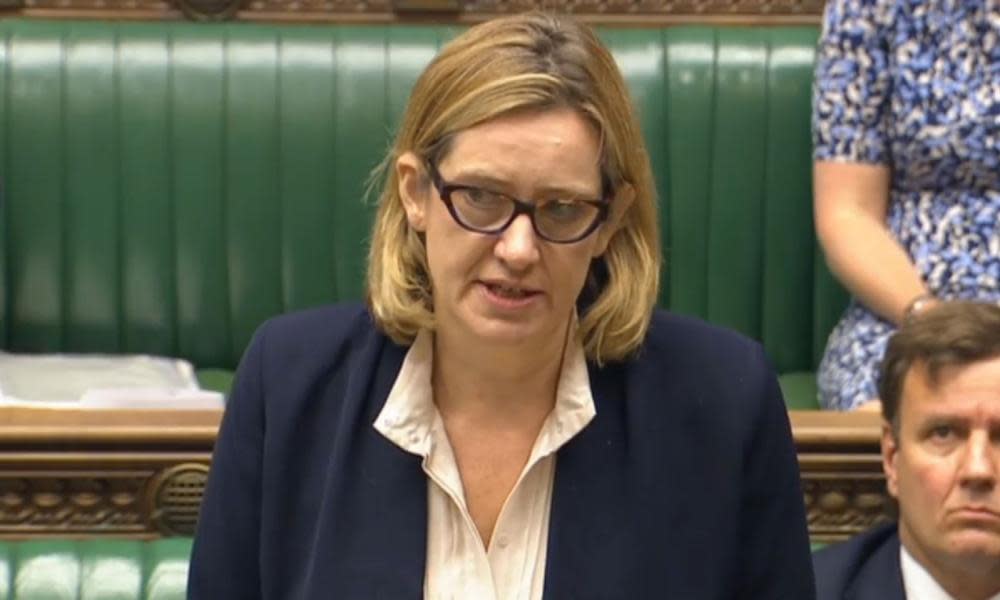Amber Rudd accepts police too stretched in wake of terror attacks

The home secretary, Amber Rudd, has acknowledged for the first time that stretched police resources in the face of four terror attacks in three months mean counter-terrorism operations cannot continue at an emergency level indefinitely.
Rudd has told MPs that police resources “have been pulled very tightly” as they try to tackle “a new phase” in the terror threat, but has ordered a rapid review of the handling of the recent attacks “before rushing in with additional money”.
Her explicit recognition of the stretched resources facing the police came in the House of Commons in response to a question from former Labour police spokesman Jack Dromey.
He had pressed Rudd over a leaked letter from Britain’s four most senior police officers expressing concerns that the three-month emergency plan they have put in place was not sustainable and was diverting officers from child abuse and serious and organised crime inquiries.
Rudd insisted that the emergency plan, Operation Roset, was exactly what had been foreseen for the situation but she recognised the concerns of the four senior officers, who included the Metropolitan police commissioner, Cressida Dick, and the head of counter-terrorism, Mark Rowley.
“The system is working. They needed the additional support because, of course, under these circumstances resources have been pulled very tightly given the additional work that is needed. There are different ways of addressing this and before rushing in with additional money I want to make sure that we get the right targets and the right answers,” Rudd told Dromey.
“I recognise what they are saying. I recognise that we cannot carry on that emergency level indefinitely but we are just going to be working with them to ensure we get the right response,” she said.
Dromey said the legacy of previous cuts had led to neighbourhood policing, which was a crucial source of intelligence gathering, being hollowed out, while officers were being pulled away from critical areas such as child sex abuse inquiries and organised crime units.
“In the aftermath of the four horrific attacks we have seen this year, Theresa May must accept responsibility for her legacy as home secretary. Now that her government has acknowledged the unsustainable situation that the police face, they must act to reverse their damaging police cuts.”
Rudd announced the appointment of David Anderson QC, the former official reviewer of the terrorism laws, to carry out a review of the handling of the recent terror attacks to look at what lessons could be learned from the official response. Anderson later tweeted that it would be “an operational/internal review” but he had not yet seen any terms of reference.
The home secretary said a second review of Britain’s counter-terrorism laws would also be carried out “to make sure that the police and security services have what they need to keep us safe” now that the country appeared to have entered a new phase of terrorist threat. In response to MPs’ questions, Rudd hinted that she may consider extending the use of Tpims – the replacement for control orders to monitor terror suspects – but said that would need parliamentary legislation.
Rudd also stressed the government’s plans to do more to force tech companies to take down terror-related content from their platforms, including the possible use of sanctions, and the intention to set up a commission for countering extremism that would “stamp out extremist ideology”. She compared the new commission to the Commission for Racial Equality set up by Labour in the 1970s to tackle racism.
The shadow home secretary, Diane Abbott, said Labour would look at any proposals for new terror laws “on their merits” but believed ministers should focus on providing more resources for the police and security services, saying it was resources rather than new legislation that was at the heart of the issue.

 Yahoo News
Yahoo News 
